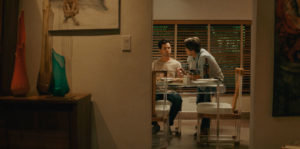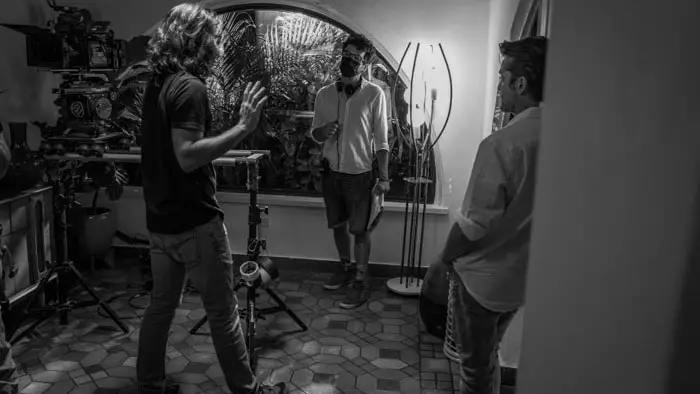
Was it challenging to get people to support the film by the nature of the story…the kidnapping?
Oscar: This was not the classic kidnapping thriller, and the nature of the characters is not as simple as good and evil. One of our most significant challenges was to go to the past of both characters and reconstruct the back story to inform their present. Justin is more of a complex character than a typical victim, who carries a great power of understanding, empathy, and courage. Personally, since I began my studies, I have been influenced by films like Pedro Almodovar’s, where the characters are transgressors and seek the truth as human beings regardless of being born from the pages of a script.
Carlos: In terms of support, we had a strong foundation in Jim Kierstead and William Fernandez, two established producers from Broadway. Jim being the playwriter and a therapist himself, added another layer of credibility to deal with this complicated subject. Always sparking debate and conversation, the film connected with audiences at every festival we played. We received tremendous support from film festivals and industry platforms, including the Sundance LFN Distribution Program.
Speaking of the kidnapping, what was your philosophy regarding building tension in the story?
Carlos: From the opening credits, we actively play against the usual notion of building tension. Instead of ominous and eerie, we opted for nostalgic music and stylized visuals to accentuate David’s curated life and his attachment to a past long gone. Nevertheless, David shows signs that there is a dark side behind his willful isolation, and soon enough, he crosses an unforgivable line. As the film progresses, we develop a slow-burning tension between Justin and David that defines their relationship.
Oscar: The peculiarity of this story is that we had to play with psychological tension even more than the physical one. Expanding on what Carlos said, David is gaslighting Justin into thinking he is “borrowed,” not kidnapped. Justin plays along and tricks David into thinking he is willingly staying, only to find the best moment to escape. But their past brings them together, and they establish an unlikely connection along the way. The tension rises as both characters become unreliable to each other and the audience. This invites the viewer to engage in piecing together the characters’ hidden motivations while understanding their core traumas.

“…there is a dark side behind his willful isolation, and soon enough, he crosses an unforgivable line.”
Can you discuss the decision to feature both Spanish and English in the film prominently?
Oscar: Many factors led us to film in Spanish and English. The first was moving the story from New York to the Florida Keys, where it’s organically easy to find bilingual conversations in all settings. In times when interactions between different cultures are becoming more and more common, it seemed that shooting the film bilingual could contribute to the story. But the definitive factor was the casting.
Carlos: Following the success of our first feature, The Last Rafter—a bilingual film with Hector Medina as the lead—our producers agreed that he was perfect for the role of Justin so we started writing the film with the idea of making Justin multicultural and bilingual. Initially, David would only speak English, but since casting Jonathan Del Arco, we embraced the hints of his Uruguayan heritage, which has a different accent and idioms than Hector, adding even more interesting nuances to the characters.
Tell me about your actors and why you chose them for their roles.
Carlos: Hector Medina was previously acclaimed for his performance in the LBTQI+ Oscars-shortlisted Irish-Cuban film Viva. We worked together on our first film, and we loved continuing our collaboration. Through the wonderful work of our casting team Carla Hool and Byron Beane, we cast Jonathan Del Arco for the role of David, who brought not only his cultural heritage and 30 solid years of experience in the industry but also his voice as a gay activist. Even though the characters are far removed from their personal experiences, Jonathan and Hector support the story and embrace it on a deep level, bringing a unique dynamic to the set. They are overall amazing human beings, and I feel fortunate to have shared this journey together.
Oscar: The character of David from the original script was radically different from the one we created for the film. So, in terms of the casting process, David was the most challenging role. We wanted a perfect balance between charming and terrifying. When first meeting with Jonathan Del Arco, we realized that he could handle both opposite sides of David perfectly. We talked about the character and how important it was for us to understand David’s trauma, and he got it right from the start. As for Justin, once we decided that he was going to be Latino, Hector Medina was the best actor for the role.

[…] Source link […]